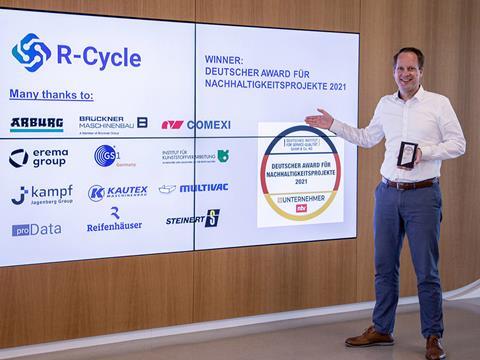
R-Cycle - the digital product passport for sustainable plastics - has received a German Sustainability Award in the ‘Packaging’ category.
The award is conferred by the German Institute for Service Quality (DISQ), the German news channel ntv, and DUP UNTERNEHMER (German Entrepreneurship Platform for Digitalization and Sustainability). The award is patroned by Brigitte Zypries, former Federal Minister.
Even in the "recycling land" of Germany, it is reported that only about 6% of plastics from domestic waste are recycled to make equivalent new products. The largest percentage of over 65% is reportedly burned in waste incinerators.
One reason for the low recycling rate is the present difficulty in terms of identifying the different compositions of plastic packaging in the recycling process. R-Cycle says that sorting is “considerably improved” when a digital product passport is affixed to plastic packaging to display this information.
R-Cycle is such a digital product passport. It is based on an open standard and is machine-readable via special markings. R-Cycle automatically registers all recycling-related properties during packaging production and passes this information along the value chain.
Waste sorting plants can then identify recyclable packaging and form recyclable fractions. The companies involved in the project say that this is the basis for obtaining pure and therefore high-quality recyclates as part of efforts to set up a functioning circular economy.
"We are delighted to receive this award," says Dr. Benedikt Brenken, director of the R-Cycle Initiative. "Digitalization and sustainability are two megatrends that we have integrated beneficially in R-Cycle. The use of a digital product passport, as also required by the European Union, offers enormous potential to increase the recycling rate of plastic packaging."
R-Cycle is being developed to market maturity by companies and organizations along the entire plastic-packaging life cycle. Besides improving product sustainability, the companies say that manufacturers can increase their process efficiency and product quality by using a digital product passport.
Detailed information about the raw materials used speeds up production and registering the product properties also seeks to add value for customers in downstream processes.












